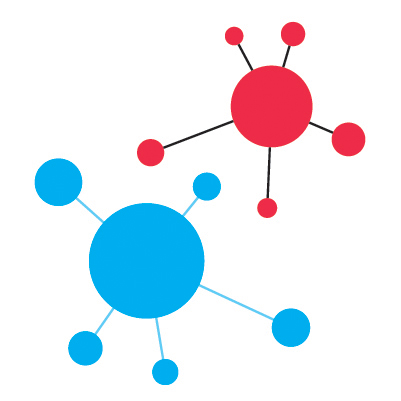Our research in AI

The University is a core member of the Luxembourg AI Factory consortium. Our dedicated team of researchers and experts at Uni.lu work collaboratively to explore and develop advanced AI technologies, aiming to address real-world challenges and contribute to the global scientific community. Here, you will find information about our latest projects and publications as well as insights into how our research is making a positive impact. Join us as we explore the possibilities of artificial intelligence and make a contribution to society.
AI Research groups at Uni.lu
At the University of Luxembourg, Artificial Intelligence is both a subject of deep scientific inquiry and a powerful tool driving innovation across disciplines. Our AI ecosystem includes two distinct yet complementary communities:
- AI Research Groups who focus on advancing the core technologies of AI itself: developing new algorithms, improving machine learning models and exploring the theoretical foundations of intelligent systems.
- AI-Enabled Research Groups who apply AI tools and methods to enhance their work in other domains, such as health, finance, law, or environmental science, using AI as a means to accelerate discovery, improve predictions or analyze complex data.
Together, these groups form a dynamic interdisciplinary network pushing the boundaries of what AI can do and how it can be used to solve real-world challenges.
Our research projects
This section presents an overview of current research projects in artificial intelligence conducted at the University of Luxembourg. These initiatives span a range of topics, including machine learning, data science, robotics, health and biology and the ethical dimensions of AI. Our work reflects a commitment to academic rigor and interdisciplinary collaboration, contributing to both theoretical understanding and practical applications of AI technologies.
Browse our AI research projects by topic
Computational Engineering & Sciences
-

Physics-based wireless AI providing scalability and efficiency (PASSIONATE)
PASSIONATE will pave the way to a complete change of paradigm in the way AI/ML is applied to wireless communications, developing physics-based native AI tools. -

Commercialisation of an Application for Requirements Engineering (DRONA)
A digital assistant that provides semi-automated support for the definition of system requirements, their verification and the generation of documents. -

sElf-evolving terrestrial/non-Terrestrial Hybrid nEtwoRks (ETHER)
ETHER will provide a framework for a unified terrestrial/non-terrestrial network ecosystem by leveraging key lower- and higher-level technical innovations. -

European National Competence Centres in High-Performance Computing (EUROCC2)
EUROCC2 aims to strengthen Europe’s capabilities in high-performance computing (HPC), data analytics, and artificial intelligence. -

European Master for High Performance Computing (EUMaster4HPC)
A European consortium leading educational activities, funded by the EuroHPC Joint Undertaking to design and implement the first pan-European HPC Master. -

NETCOM
Using non-equilibrium thermodynamics to optimize the energy demand of computation
Autonomous
Vehicles
& IoT
Information
Security
-

Autonomous and Self-organized Artificial Intelligent Orchestrator for a Greener Industry 5.0 (TALON)
TALON introduces an AI orchestrator that envisions transforming the I5.0 into an automated intelligent platform. -

Ontology-Based method for Interdisciplinary Data Protection Impact Assessment (OBI-PIA)
OBI-PIA aims to offer a lightweight and usable approach for interdisciplinary DPIAs assessment, leveraging ontological domain conceptualisation and model-based discussions to bridge computer science, legal studies, and policy on data protection.
Fintech
-

Automated Investment Advice using Artificial Intelligence on Satellite Data (FinSat)
The FinSAT project explores the use of artificial intelligence (AI) and satellite data to develop automated investment strategies that provide real-time financial insights. -

Data Science and The Economics of WELLbeing (DSEWELL)
DSEWELL brings together machine learning approaches, physics-inspired descriptors, and the economics of wellbeing to address questions broadly related to predicting life satisfaction and health of individuals in a data-driven manner. -

PayPal-FNR PEARL Chair in Digital Financial Services
The PayPal-FNR PEARL Chair drives innovation in digital finance, advancing Luxembourg’s leadership in cutting-edge financial services.
Law
-

ROBOtic Process Automation in Anti-Money Laundering COMPliance (ROBOCOMP)
The ROBOCOMP project addresses the increasing use of automation, particularly machine learning tools, in Anti-Money Laundering (AML) compliance by financial institutions. -

Law and AI: WaYs to Explore Robust Solutions (LAIWYERS)
-

INformation in the EU’s DIgitalised GOvernance (INDIGO)
A three-year multi-disciplinary research project on impact of digitalisation on multi-jurisdictional implementation of policies in Europe. -

Criminal Proceedings and the Use of AI (CRIM-AI)
This cutting-edge research project compares how, and in what circumstances, AI is used in criminal proceedings in seven countries. -

Data Lake – A Legal Analysis of Datalakes (AI LegalLake)
This project brings together a team of experts to focus specifically on the impact of the rise of Artificial Intelligence (AI) in the field of financial forensics
Neuroscience
-

Molecular Dynamics Simulations of Ion Channels for Guiding Pharmacological Treatments of Neurological Disorders (IonMolDyn)
-

Audacious Brain Cognition Data Embeddings (ABCDE)
In this project, ABCDE will transfer the concept of embeddings to the domain of image analysis for studying brain function and cognition.
Systems Biology
-

CAncer Microbiome: Emergent Organisation and Stability across scakes (CAMEOS)
-

Leveraging Knowledge-Enhanced Deep Learning Models for Cell Reprogramming (KDReCell)
KDReCell aims to revolutionise cell reprogramming through foundation AI models. Combining deep learning with biological knowledge networks, it seeks to understand and control cell differentiation processes.
Bioinformatics
-

HeraMetis
HeraMetis revolutionizes immune data analysis with AI and HPC, offering scalable, automated, and user-friendly tools for clinical and research applications -

Data-driven Physiological and Endocrine Research on Fatigue and Recovery Monitoring (PERFORM)
The project focuses on two main case studies: biological and psychological markers in relation to i) injury risk and fatigue in athletic populations and ii) mental health in at-risk populations. -

Integrative Data Analysis in Epilepsy (IDAE)
The project will develop new approaches for mechanistic data integration in biomedicine and apply them to heterogeneous data sets on epilepsy to facilitate improved patient stratification.
Space Systems
-

Leveraging AI to Empower the Next Generation of Satellite Communications (SmartSpace)
SmartSpace investigates what Artificial Intelligence (AI) can bring to satellite communications. -

Next gEneration Architectures and TECHnologies for telecom digital processors (NEATECH)
The NEATECH project aims to develop advanced processor architectures using strategies that prioritise high integration and low power consumption.
Materials
-

Liquid-Crystal Elastomer Robotics (LICER)
LiCER proposes to design, develop and demonstrate an instrumented actuator from liquid crystal elastomers (LCEs), with the aim of building a soft endoscope robot. -

An AI-Based Non-Destructive Approach for Determining Steel Grades for Steel Reuse application (Regainsteel)
Philosophy
Chair in Cyber Policy
Led by Assoc. Prof Niovi Vavoula, the Chair in Cyber Policy is a joint initiative between the University and the Directorate of Defence.
The Chair in Cyber Policy focuses on
- legal,
- ethical,
- and policy challenges of AI.
Fascinating reflections about artificial intelligence
-

-

-

-

-

-

FDEF
AI in law enforcement and criminal justice contexts: A preliminary rights-based assessment by the European Parliament





